Interview with a terrorist: Documentary on former ETA chief creates a stir at San Sebastián Film Festival
‘We believe in our work and we stand by it. It is not a documentary that whitewashes or justifies ETA,’ say the interviewers
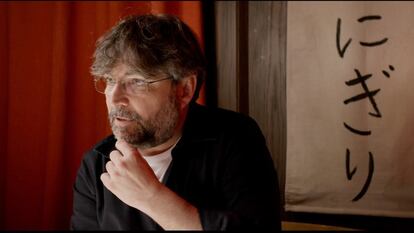

The announcement that the Netflix-backed documentary No me llame Ternera – Don’t Call Me Ternera – will be screened on September 22 at the San Sebastián International Film Festival in northern Spain has triggered protest. The film features an interview by journalists Jordi Évole and Màrius Sánchez with Josu Urrutikoetxea, better known as Josu Ternera, who was a leading figure within the Basque terrorist group ETA and one of its most ruthless members. Can a festival give airtime to such a man? Might it not feel like an affront to his victims?
An open letter titled Against the whitewashing of ETA and Josu Ternera, published on Monday night and signed by 500 people, called for the withdrawal of the 101-minute film. However, festival organizers have confirmed that it will be screened as planned. “It is a very interesting film for many reasons,” says the festival’s director, José Luis Rebordinos. “It kicks off with a victim and ends with a victim. The fact a victim has the first and last word is a declaration of principles. Everyone is going to be able to see it without a fuss.”
The current controversy over the film’s screening is reminiscent of the protests that accompanied the 2003 documentary La pelota vasca – The Basque Ball: Skin Against Stone – by Julio Medem. The situation in Spain now, however, is very different: ETA announced “the definitive cessation of its armed activity” in 2011, although during the last election campaign the armed group’s ghost resurfaced on the back of “Que te vote Txapote” (Let Txapote vote for you), a slogan using the name of a convicted ETA terrorist that was chanted by the far right to attack Socialist Prime Minister Pedro Sánchez in response to his political dealings with the left-wing Basque pro-independence party EH Bildu.
Évole and Sánchez have both confessed to being surprised by the written protest against the film’s screening: “We understand that a film about an interview with a member of ETA can generate debate, but we are surprised that people are expressing their opinion and even requesting that a documentary that none of the signatories have seen be pulled from the festival,” said Évole. “We believe in our work and stand by it. It is not a documentary that whitewashes or justifies ETA.” However, Évole does realize the film’s potential for controversy. “We knew it was something that could happen,” he said. “ETA’s terrorism is an issue that still causes a lot of pain in our country, because it is very recent, and it was devastating. But we did not imagine that there would be people opposing the documentary before even seeing it.”
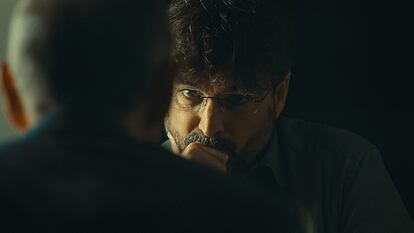
The two journalists insist that they respect all opinions provided they are based on an actual viewing of the film. Regarding any pain caused to victims, they have issued a statement saying, “We are well aware of the pain caused by this violence and of the impact that the mere news of the existence of the film could trigger. The film features a direct victim of an attack in which Urrutikoetxea participated – this person opens and closes the film and thanked us for having shown them the interview because it provided them with information they did not know about the attack they were a victim of.”
Josu Ternera has been charged by Spanish prosecutors with 11 murders and 88 attempted murders (as many as there were wounded people in the 1987 attack on the Civil Guard barracks in Zaragoza, where five of the deceased were children), and is looking at a sentence of 2,354 years in prison. After 17 years on the run, he was arrested four years ago in France and has been on probation since 2020 while waiting for the resolution of a French case before extradition to Spain.
ETA terrorism and violence in the Basque Country have always been reflected at a film festival that is held in a city located at the heart of Spain’s Basque Country. In 1979, Gillo Pontecorvo’s Operation Ogre, about the assassination of former prime minister and Franco right-hand man Luis Carrero Blanco by ETA, was withdrawn from the official section three days before its screening as there were alleged problems with the Spanish version of the film, which departed from the international version. El Proceso de Burgos – Burgos Trial – by Imanol Uribe, a director known for his work portraying the Basque conflict, was shown the same year. Uribe also premiered the 1981 La fuga de Segovia (Escape from Segovia) at San Sebastián and the 1994 Días contados (Numbered Days), which won the Concha de Oro, the only film about ETA to do so.
Eloy de la Iglesia’s El Pico (Overdose) was also screened here in the 1980s, although the boom of films about ETA came in the 21st century, with milestones such as Eterio Ortega’s documentary Asesinato en febrero (Murder in February) in 2001; then there was La pelota vasca, by Julio Medem, and movies such as the 2008 Tiro en la cabeza (Bullet in the Head) by Jaime Rosales, an icy portrait of an attack; the 2014 Negociador (Negotiator) by Borja Cobeaga, and Maixabel, by Icíar Bollaín, in 2020, a year that also saw the HBO release of the series Patria (Homeland), adapted from the novel by Fernando Aramburu.
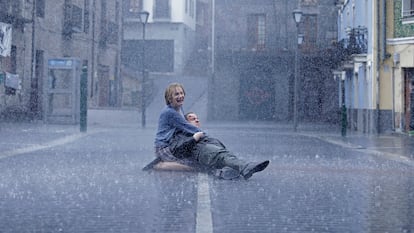
In the last decade, films about terrorism have multiplied. There have been 15 directly exploring the topic and others that touch on it. This is mostly due to the explosion of the documentary format that works well on streaming platforms. In 2022, there was 918 Gau, by Arantza Santesteban; Gesto, by Xuban Intxausti, and Hirugarren Koadernoa, by Lur Olaizola. “We have a very complicated history of violence,” Rebordinos explains. “With ETA finished, it is easier to make films about different points of view, which is what interests me. It’s easy to say that ETA did monstrous things – which is true – and say that’s the end of it. But, when it comes to history, you have to analyze, listen and learn so that it doesn’t repeat itself.”
The San Sebastián Film Festival depends on a board of trustees comprised of the regional Basque government, the City Council, the Provincial Council of Gipuzkoa and the Spanish Ministry of Culture. The mayor of San Sebastián, Eneko Goia from the Basque Nationalist Party (PNV), explains: “As a member of the public rather than mayor, I am old enough and have enough intellectual capacity to judge a film by myself. And I don’t like anyone censoring what I can see or what I can read, because that belongs to a bygone era. I don’t understand the positions that are proliferating lately in an exaggerated way. I totally agree with the director of the film festival.”
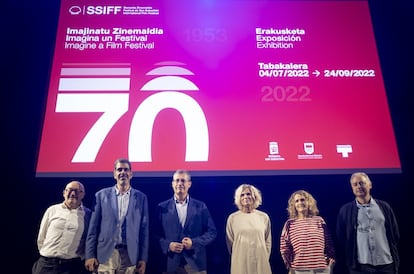
Regarding the controversy surrounding the screening of Don’t Call Me Ternera, Goia adds, “I have not noticed any debate or controversy. Here, people are taking it in stride. The viewers will decide whether to watch the documentary or not, and then each one can give their own opinion.”
Among the 514 signatories of the protest letter there are intellectuals, journalists, politicians and victims of terrorism such as Mari Mar Blanco (whose brother Miguel Ángel was kidnapped and executed by ETA in 1997).
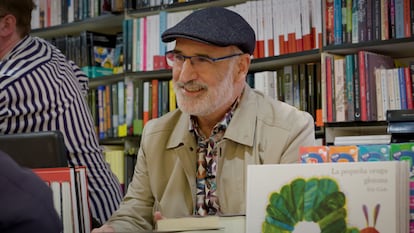
One of the protest letter’s signatories, the writer Fernando Aramburu, whose novel Patria was turned into an HBO series and premiered at the 2020 San Sebastián Film Festival, explained his position from his home in Hanover, Germany: “I agree with some statements by the festival director, who months ago, in a bid to oppose fascism, publicly stated that ‘culture must not be silent.’ This is what I have done by signing the protest letter. Mr. Rebordinos indicated that he was closing the festival door to [Spain’s hard right party] Vox, a party that speaks its mind, certainly in debatable fashion, but as far as I know is not dedicated to planting bombs or shooting anyone in the back of the head. The festival also, by the way, closed the door on a documentary by Iñaki Arteta that was critical of terrorism. Obviously, he does not apply the same yardstick to a man for whom the adjective “bloodthirsty” would be an understatement. The festival is held in a city where the group led by the interviewee murdered most of his victims, almost 100. It must be unpleasant to walk down the street and come face to face with a poster advertising a movie about the person who orphaned you or killed your son or daughter; him or any of his underlings.”
Regarding the need to see the film before demanding its withdrawal, he adds, “It is a flawed argument…. No one is judging the content, the documentary value of which I have no doubts about. What is being questioned is the opportunity to offer a platform, a showcase, a red carpet, to a terrorist par excellence during a particular celebration of unquestionable cultural value and widespread international projection, with an astounding lack of tact.”
Iñaki Arteta, who has been filming documentaries on the Basque conflict since 2005, said that he supports the screening of the Josu Ternera documentary but “I do understand that the victims feel it as an affront, probably because they are not clear about the result of an interview carried out by Évole.”
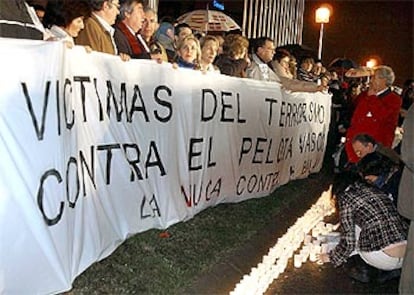
According to Koldo Zuazua, who was the executive producer of Julio Medem’s documentary,“it’s a controversy born out of ignorance as we haven’t yet seen Don’t Call Me Ternera. It is very similar to what happened with La pelota vasca. Before giving an opinion, you have to know.”
But is it necessary to give a platform to murderers who have shown no remorse for their actions? “It is not about giving them a voice, but about listening to what the man says,” Zuazua explains. “That does not mean agreeing with him or whitewashing him. I’m certainly going to see it. And I support Rebordinos, who has offered to show the film to the signatories of the protest letter in an earlier screening.”
Sign up for our weekly newsletter to get more English-language news coverage from EL PAÍS USA Edition
Tu suscripción se está usando en otro dispositivo
¿Quieres añadir otro usuario a tu suscripción?
Si continúas leyendo en este dispositivo, no se podrá leer en el otro.
FlechaTu suscripción se está usando en otro dispositivo y solo puedes acceder a EL PAÍS desde un dispositivo a la vez.
Si quieres compartir tu cuenta, cambia tu suscripción a la modalidad Premium, así podrás añadir otro usuario. Cada uno accederá con su propia cuenta de email, lo que os permitirá personalizar vuestra experiencia en EL PAÍS.
¿Tienes una suscripción de empresa? Accede aquí para contratar más cuentas.
En el caso de no saber quién está usando tu cuenta, te recomendamos cambiar tu contraseña aquí.
Si decides continuar compartiendo tu cuenta, este mensaje se mostrará en tu dispositivo y en el de la otra persona que está usando tu cuenta de forma indefinida, afectando a tu experiencia de lectura. Puedes consultar aquí los términos y condiciones de la suscripción digital.








































